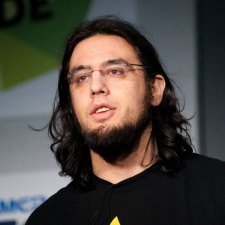Rami Ismail - one half of Dutch indie studio Vlambeer - knows a thing or two about making mistakes: he estimates that his own dumb decisions have cost his company somewhere in the region of $1.3 million.
"One of my first mistakes cost me $30,000," he said on stage at Gamelab 2015 in Barcelona.
A poor negotiation with Cartoon Network saw Vlambeer earn just $30,000, while a fellow developer managed to get $60,000.
"Mistake two: our game got cloned".
By working on Radical Fishing's iOS follow-up Ridiculous Fishing in complete secret, "We gave our cloners all the opportunity to take our idea."
The game, Ninja Fishing, made over a million dollars according to Ismail.
Fail fast
His most recent mistake? Trying to fix his last one, by live-streaming the development of new game Nuclear Throne so the ideas couldn't be pinched.
"It's really hard to program when thousands of people are watching," he says, estimating that Twitch has cost the team half of its development time.
Of course, the old adage 'learn from your mistakes' rings true.
Every time you're wrong you learn something.Rami Ismail
"I've started to realise that wrong isn't bad," he says. "Every time you're wrong you learn something. The one kind of wrong that is a shame is doing something that someone else has already done wrong."
So, in an attempt to help developers avoid going wrong, Ismail has listed some of the most common mistakes indie developers make when starting out. Here are some of the most important for mobile game makers to avoid.
- Closed culture
"We tend to take inspiration from ourselves," says Ismail.
"With convergent design, everything is moving towards the same point." Have you ever noticed that every console game these days has a radial menu, and the ability to unlock things on a map?
"Because we keep taking inspiration from ourselves, we keep making the same decisions, and we don't make things that are radically different. But that's a way to get your game discovered."
- Scope and crunch
"Our industry is the worst at two things: scheduling and scope. If you ever ask a programmer how long something will take, don't believe them. If you ever ask someone how big a game will be, don't believe them."
This inevitably leads to crunch - insane working hours to get a game finished in time. "I've done crunch. I thought it was cool. Gotta be a hero, save the game, stay all night and make it happen."
"What crunch really means: whoever is the producer of the game is shit," he warns.
- Communication
"One of the biggest mistakes is people trying to use words to express something in games. We're not writers, we're game developers."
"One of the things about video games is that they're interactive, they have a certain feel that you can't explain in words. You can flush a whole bunch of money and time down the drain when you think your agreeing, but you're really not."
"If you want to explain a game mechanic, build a prototype."
No artist would try to explain their vision without a sketch. No musician would try to talk about sound without sounds so "Communicate about games in games. It's our language."
- Marketing
"People start too late with marketing. The most frequent question I get is 'My game is releasing tomorrow. What can I do to market it?'
The answer: 'Nothing!'."
- Team size
"Indie developers are too big," says Ismail.
Every person on the team is adding an extra salary that must be paid, alongside other costs like licensing fees and office rental.
"I've seen too many student projects that have failed because they've kept around the three people who are kind of nice."
Nice: but not giving their all to the project. Team members should be given a chance to grow, but if it's not working out, they've got to be cut loose.
Don't fear being wrong. The worst thing you can do in being wrong is not learning.Rami Ismail
"A studio is only as good as the people that it consists of," says Ismail. (Vlambeer is, outside of collaborators, just two people.)
- Being prepared
"One of the most painful things is if you make a really good game, but it doesn't get found.
"But even worse - once, a developer's game got discovered but the website crashed." When the site finally came back online, the indie game made the tiniest fraction of what it could have made.
"Make sure you're prepared for when you get discovered," he says.
- Everyone's wrong, and that's great
Why? "Because it gives us stories to help others."
Before the questions and answers session, Ismail got developers in the crowd to fess up to mistakes they've made in the career, like a terribly nerdy version of Alcoholics Anonymous.
"Being wrong isn't bad. It's how long you're wrong, and how long it takes you to fix your mistakes," he says.
"Don't fear being wrong. The worst thing you can do in being wrong is not learning."





















